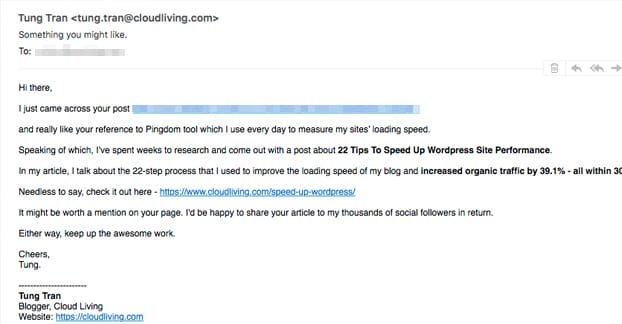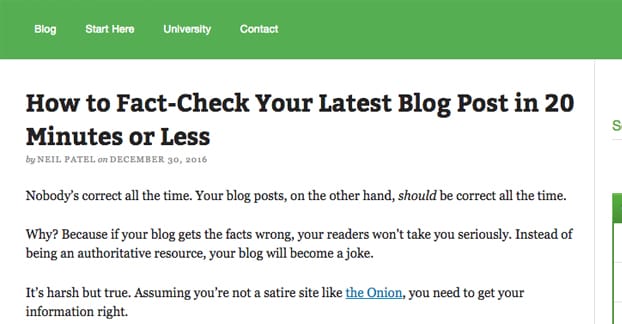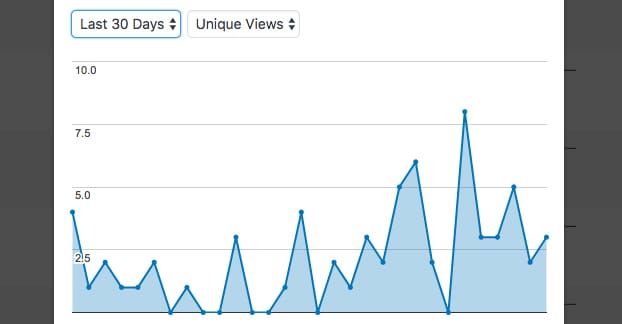We’ve already covered this topic from the other angle; does posting guest posts on other sites bring in traffic? Now let’s cover the issue from the other angle. Does publishing guest posts from other authors on your site bring in traffic?
The answer, as you should probably expect by now, is “maybe, depending on things.” There are a lot of possible factors that determine whether or not publishing a new guest post will get you any traffic, so let’s go over those factors.
Analyzing Guest Posts
If you want to get traffic out of a guest post you publish on your site, you need to make sure the post is valuable. If the post isn’t at least up to your minimum quality standards, it’s going to drag down your site overall. You might get some traffic out of it, but the hit to SEO might not be worth it.
Make sure the author doesn’t suck. Google their name and their site and check it out. Does the author have a bad reputation? Is their name attached to spammy blogs or near-duplicates of the guest post they sent you? Is there content all over the place in terms of quality? Even good content from a bad author can be detrimental, so avoid working with authors with a bad reputation.
Is the content worthwhile? Auditing the content before you publish it is essential. It needs to be free of grammatical and spelling errors, and it needs to be of sufficient length to match your site.
You should also audit the topic of the content. For one thing, make sure the perspective fits your site. If you’re selling a product that serves as an alternative to Google Analytics, you don’t want to publish a guest post about how Google Analytics is Good Enough. You want to publish content about how it’s a limited platform, reminding users of their pain points and why your solution is better.
I tend to lean towards only accepting content that I couldn’t create myself. The author needs to bring something new to the table, whether it’s their own case studies or data sources, a unique perspective, or an overlap with an industry I’m not experienced with.
Always look over the content with an eye on your users. Are your users going to find this content valuable? I could publish something about real estate marketing, but if none of my customers are real estate brokers, what good does it do me? It could attract them, so it could be valuable, so it might be worth publishing.
Are the facts actually facts? Always audit any claims the user makes. Ideally they will cite their sources, and their sources will be reputable publications, not just their own blog or some PBN with some unsourced claims of their own. If they’re stating “facts” that don’t line up with most industry accepted data and conclusions, they’re probably pushing an agenda you might not want to support. For examples, just look at all the “alternative health” blogs that share “cancer cures” like black salve. You don’t want to publish content that puts you among the wrong kinds of circles.
Are the links worth publishing? Always have a clause in your guest posting contract or agreement that states you reserve the right to remove or nofollow any link in the post. If you don’t like any site the author links to, either remove the link or find an alternative. If you’re “paying” the author with a link, you can limit it to a link in the bio for the author, where it is limited in the damage it could do to your site.
Is the content suitable for your site? There are a lot of ways it might not be. It might be too simple for your more technical and experienced audience, or it might be too technical for your novice audience. It might point to enterprise-level tools where you generally target small businesses. It might be a very formal third person where you usually write in first person. Make sure the content fits your style and your target audience as much as possible.
While you’re at it, make sure you own the content at the end of the day. The author has their name attached to it, but you reserve the right to unpublish it, edit it, or even repost it on another site if you so desire. The content is, for practical purposes, yours.
That said, make sure the content actually IS available for your use. Run it through copyright scanners like Copyscape to make sure it isn’t plagiarized or syndicated from some other location.
Is the author capable of supporting the content? After the content is published, a good guest post author shares it with their social media, links to it from their site, and generally helps support it. After all, the better the guest post does on your site, the more they stand to benefit. This is also part of the author audit; if they’re too small and have no audience or social following, they aren’t bringing much value to the table, so you might not want to work with them.
Traffic Sources
Now, assuming that you’ve gone through and filtered potential guest posts for the above criteria, there’s a good chance you’re going to be able to gain traffic from publishing the post. However, it’s not always direct traffic. Let’s look at the value you can get out of a guest post you publish.
Links from the author. Assuming the author has passed your minimum threshold for their own audience, they should be able to bring value to your guest post by linking to it. Their blog should, ideally, get traffic and have some reasonable domain authority associated with it. The links they publish, from their site to your guest post, should be followed and should send value across the link to your page.
Value here comes in two forms; the link itself and the traffic that follows it. The link, followed, means Google can assign some link juice to it. No single backlink is going to jumpstart your SEO unless it’s from a site like Forbes, but in aggregate, many such links will be valuable overall.
Traffic from the link relies on the author’s ability to mobilize their following into checking on your publication. You’re likely to get a small surge of traffic when the link is published, but not a lot after, unless it’s great evergreen content. Even then, chances are the direct traffic won’t last long. Still, you should get SOME traffic.
Links from others. Content published on your site, written by a guest author, can attract links from associates of the guest author. Their partners, their friends, and people who respect them will follow their content regardless of the site that hosts it, and will link to it when they have a chance. These links help in the same way the links above do. They can bring link juice to your site, broadening your backlink profile and giving your domain more value from more varied sources. Of course, not all of these links will be very valuable; a lot of small time bloggers link out as well. Still, it’s better than nothing, and so is the traffic.
A good author with a following made up primarily of other bloggers will be able to send you more links than an author in a different niche. You can’t always count on a following made up of people who have their own sites, of course. It’s nice when it happens, but such secondary links aren’t strictly necessary.
Additional search value from the post. A lot of the traffic that comes from a guest post is actually traffic that comes from search engines. Direct traffic, really, isn’t a huge segment of a lot of modern traffic profiles. The reason Google and SEO are so important, after all, is because organic traffic is so important.
Every piece of high quality content you publish on your site is another piece of content indexed on Google, attached to your domain. Even if the author isn’t one of your native authors, it’s still content on your site. That means it boosts your SEO, it attracts traffic to your site, and it becomes part of your overall content profile.
This is why making sure the content fits your site is so important. If it can avoid cannibalizing your keywords, can attract a new segment of an audience, or can take a high ranking spot in the Google search results, it can bring in a lot of new traffic.
There’s also the value you get from filling a slot in your editorial calendar with content you didn’t have to write. Imagine this scenario: you run a site where you publish content five times a week, once each weekday. Now imagine that you can rack up enough guest contributions to publish one per week on an ongoing basis. You can turn this into a theme! Make Guest Contribution Friday, where each Friday you introduce an author and a topic and let the author contribute a post. Not only will this build a whole new theme and a whole new way of bringing in traffic, it can get you a lot of content for a minimal time investment. That time can be spent writing other content for yourself, guest posting on other sites, or working on your business in other ways.
Social media shares from the author and their audience. In addition to links and the traffic they provide, authors can share their guest contributions on their social media. When an author publishes content on your site, they should expect to help promote that content. As I already said; the better the post does, the better they do, and you can enforce this by requiring that your guest authors help promote the content they publish on your site.
Social media shares are easy to verify; just watch the social accounts of the author and make sure they share the post. You can also share the post on your own, tagging them, to attract their audience. It’s social and visible, so it’s easy to monitor.
You should ideally be tracking the social performance of the guest posts you publish. If an author overperforms on either traffic or on social exposure, keep that in mind. You can always invite that author to write another guest post for you later, or even get them to be an irregular contributor or regular author for your site. You might have to start paying them at a certain point, but you also might not, especially if they’re a good fit and are benefitting from the arrangement.
Conversely, if an author underperforms on their promises or with their content, you can keep that in mind. You can choose not to invite them back, and if they pitch another article later, you can nitpick it until they stop or outright reject it. It’s up to you, of course; as long as the post isn’t actively hurting your site, any contribution is better than nothing at all.
Paid traffic. Believe it or not, some bloggers want their guest posts to do so well that they pay to run ads to your site. It’s pretty rare, of course, but I’ve seen it happen. The kinds of people willing to pay to run ads to someone else can be valuable, though they can also get overzealous or step on the toes of your own advertising. It’s worth the time to keep an eye out for this kind of thing and make sure it’s not hurting you by competing with your ads, or something of the sort.
Overall, yes, publishing guest posts can result in traffic to your site, both directly and because of increased SEO over time. It’s a good idea to publish high quality content from reputable authors, if you’re given the opportunity to do so.
 ContentPowered.com
ContentPowered.com









